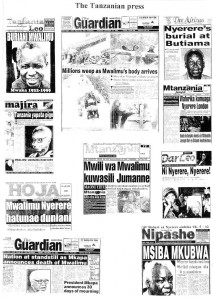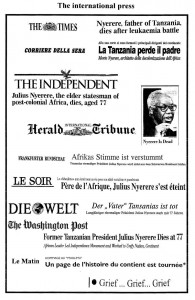Former President Julius Kambarage Nyerere died at St Thomas’s Hospital in London at 10.30am on October 14 at the age of 77 following an 18 month battle with chronic lymphocytic leukaemia. He had been in the hospital since September 24. There then began to arrive in Tanzania messages of condolence from Heads of State and others around the world and Tanzania witnessed an outpouring of national grief on a scale that the country had never seen before. Members of the United Nations stood for a minute’s silence in New York. Mourning continued in Tanzania for 30 days until November 12.
A biographical outline
JULIUS KAMBARAGE NYERERE was born in Butiama, Musoma Region in 1922, a younger son of Chief Nyerere Burite, chief of a small tribe, the Wazanaki. He first went to school at twelve years of age, but within three years he won a place at Tabora Secondary School, at that time the premier school of Tanganyika. In 1943 he went to Makerere College in Uganda to read for a teaching diploma and then went to teach at St Mary’s Roman Catholic School in Tabora. From 1949 to 1952 he was at Edinburgh University studying history, economics and philosophy and on his return took up a post at Pugu Secondary School, near Dar es Salaam. In 1953 he became President of the African Association of Tanganyika and in 1954 of its successor organisation, the Tanganyika African National Union (TANU). In 1955 he resigned as a teacher to devote himself full-time to the work of TANU. In that year, and again in 1957, he addressed the Trusteeship Council of the United Nations in New York. In 1957 he became a Member of the Legislative Council and in Tanganyika’s first elections in 1958 he was elected as a Member for the Eastern Province. In 1960 he was Chief Minister and in 1961-62 Prime Minister of Tanganyika. Tanganyika became independent in 1961. In 1962 Nyerere resigned as Prime Minister to devote himself to the work of T ANU and to build a bridge between the nationalist movement and the elected government. In December 1962 Tanganyika was declared a Republic within the Commonwealth and in 1964, after the violent revolution in Zanzibar, Nyerere was the architect of the Union between Tanganyika and Zanzibar and the setting up of the United Republic of Tanzania of which he was elected President in 1964. In 1963 he had tried to persuade the leaders of Uganda, Milton Obote and of Kenya, Jomo Kenyatta, to form with him an East African Federation but was not successful. The highlight of his attempt to build socialism in Tanzania was the Arusha Declaration of 1967 and he then nationalised the commanding heights of the economy. In 1971 he forced though a radical programme of villagisation (ujamaa). In 1978 Uganda’s ruthless dictator Idi Amin invaded Tanzania and Nyerere sent 45,000 Tanzanian troops to overthrow him. Mwalimu was one of the few to support Biafra in the Nigerian civil war. From 1964 he had invited the Organisation of African Unity’s Liberation Committee to establish its headquarters in Dar es Salaam and Tanzania soon became the training ground for African liberation movements from around the continent. He was Chairman of the Frontline states from 1975 to 1985 and Chairman of the OAU in 1985. He was also the driving force behind South-South cooperation and was prominent in the setting up of the Southern Africa Development Community (SADC). Almost up to the time of his death he struggled as official mediator with the internal problems of Burundi. He retired voluntarily from the Presidency in 1985 but remained a power behind the scenes until his death.
The funeral ceremonies
On SATURDAY October 16th there was a Requiem Mass at Westminster Cathedral in London. Eirlys Park describes the scene: ‘They began to gather before ten and the cortege came, a dignified sad family dressed in black, with the flag draped over the coffin. I didn’t know we had so many Tanzanians in Britain. But those in the packed Cathedral (over 1,500) were by no means all Africans. The Britain Tanzania Society contingent, of about 20, sat together half way down the Cathedral but also there were grey-haired couples, nuns, missionaries, ex-civil servants, young and not so young hippies, solemn. All were there to pay their last respects, and were remembering. As the church filled I had not expected that Mwalimu would be with us and I caught my breath and suppressed a tear. Was it my imagination, or was even the flag looking sad too, limp, lifeless? So different from the young banner we watched rise in the independence stadium on the eve of uhuru. The reading – ‘Let us now praise famous men’ – was read by Charles, the youngest of the three sons. (The main address by Tanzanian High Commissioner in London Dr Abdul-Kadir Shareef was moving indeed – “We mourn the passing of a man we love, respect and admire”. The High Commissioner made it clear that this was a mourning ceremony for everyone and made specific reference to the presence of Muslims amongst us – probably for the first time in that place – Editor). As the coffin returned down the aisle, a European man ran across, touched the coffin and collapsed head down on his knees. We were all bereft. As the crowd waited to walk past the coffin a young girl began to sing. Her voice rose to the ceiling of that great building and echoed loud as it was joined by all the other members of the Furaha choir and other Tanzanian women there. An African lament in a London cathedral to a man who was small of build but great of stature. He had stood proud on the world’s stage and fought for freedom, rights and his beliefs but yet, he was man enough to say “I made mistakes”. May he rest in peace.’
On SUNDAY 17th the body arrived at Heathrow airport where the Air Tanzania plane was parked using the facilities usually employed for the British Royal family.
The plane arrived in Dar es Salaam at 9.03 am on MONDAY 18th and then began what the Tanzanian ‘Guardian’ described as the most emotional event ever in the history of independent Tanzania – a weeklong series of funeral ceremonies. Millions were watching silently at the airport, in the streets and on TV as the coffin was driven on a gun carriage in a motorcade slowly through the streets of Dar to Mwalimu’s house in Msasani where many more were assembled to pay tribute. On TUESDAY 19th a Requiem Mass was held at St. Joseph’s Cathedral. At the National Stadium a huge and majestic air-conditioned glass structure to accommodate the coffin had been erected. It is to be moved to the National Museum later to house a Nyerere archive. Three million people are estimated to have filed past the body during the lying in state which continued day and night.
On WEDNESDAY 20th amidst another vast throng at the National Stadium the official funeral took place. Over 400 leaders from 61 countries and eight international organisations attended, including the Heads of State of almost all the countries in East and Southern Africa plus President Obasanjo of Nigeria, Vice-President Krishna Kant of India, US Secretary of State Madeleine Albright, Princess Ann representing Britain and many others. Some 200 people collapsed on sighting the body of the Father of the Nation.
On THURSDAY 21st the Dar es Salaam ‘Daily Mail’ reported that, by l0am the streets of Musoma, on the shores of lake Victoria, were deserted as the population moved to the airport and lined the road to Mwalimu’s Butiama birthplace. It was a fiercely hot day and the plane bringing the body did not arrive until 4.50pm, two hours late. But people stayed where they were. There was total silence as the plane touched down and then the choir of St Cecilia Musoma Catholic Church broke into a sorrowful hymn. Young and old, men and women, were shedding tears. The cortege reached Butiama, 32 kms away, at 8pm and was received by members of the family and of the clan.
On FRIDAY 22nd the body lay in state at Butiama. The impressive series of commemoration ceremonies came to an end on Saturday 23rd when Mwalimu Nyerere was buried. Some half a million people from the surrounding areas had come to this small village of 50,000. Uganda and South Africa had provided planes to bring mourners from Dar es Salaam. He was buried about 10 metres from where he was born and about 20 metres from where his father and his mother had been buried. Mwalimu was laid on his side facing east. As his coffin was laid into the grave mourners wailed and many fainted. Speaking at the ceremony (his fifth major speech in as many days) President Mkapa, in the presence of President Museveni of Uganda and former President Kaunda of Zambia, gave thanks to all who had been involved in the funeral and in looking after Mwalimu in his final weeks and also to the British Prime Minister Tony Blair for his assistance.
Some individual tributes
“Africa has been orphaned by Mwalimu’s untimely death” – President Chiluba of Zambia.
“People can celebrate too. He was a person who had brought so much pride to Africa” President Jerry Rawlings of Ghana.
“… a world statesman and a truly revered leader who would forever be remembered for not only being father of the Tanzanian nation but also for having become the voice of freedom and unity of Africa -Vice-President Krishna Kant of lndia.
“Nyerere will be remembered for the good work he did, not only for Tanzania, but for the whole of Africa” -Nigerian President Olesegun Obasanjo.
” … Our political elder … ” -President Yoweri Museveni of Uganda.
“Recognised throughout Africa and the world for his dignity and intelligence and for his unquestioned personal and political integrity Canadian Prime Minister Jean Chretien.
“For the men and women who have served the great cause of development in the world, one of the lights of our lives has gone out … While world economists were debating the importance of capital output ratios, President Nyerere was saying that nothing was more important for people than being able to read and write and have access to clean water” James Wolfensolm, President of the World Bank.
‘ …. When he told his mother in 1985 that he had decided to retire as President her response, which he gleefully repeated, was “Julius, you are a silly boy”. But his decision to stand down only added to the high regard in which he was held. Nevertheless, from that day until his death, Nyerere remained the first among equals. His endorsement was to be a vital component of any contemporary Tanzanian politician for, in truth, he never ceased to be Tanzania’s leader … ‘ former Tanzanian journalist David Martin in the Dar es Salaam Guardian.


